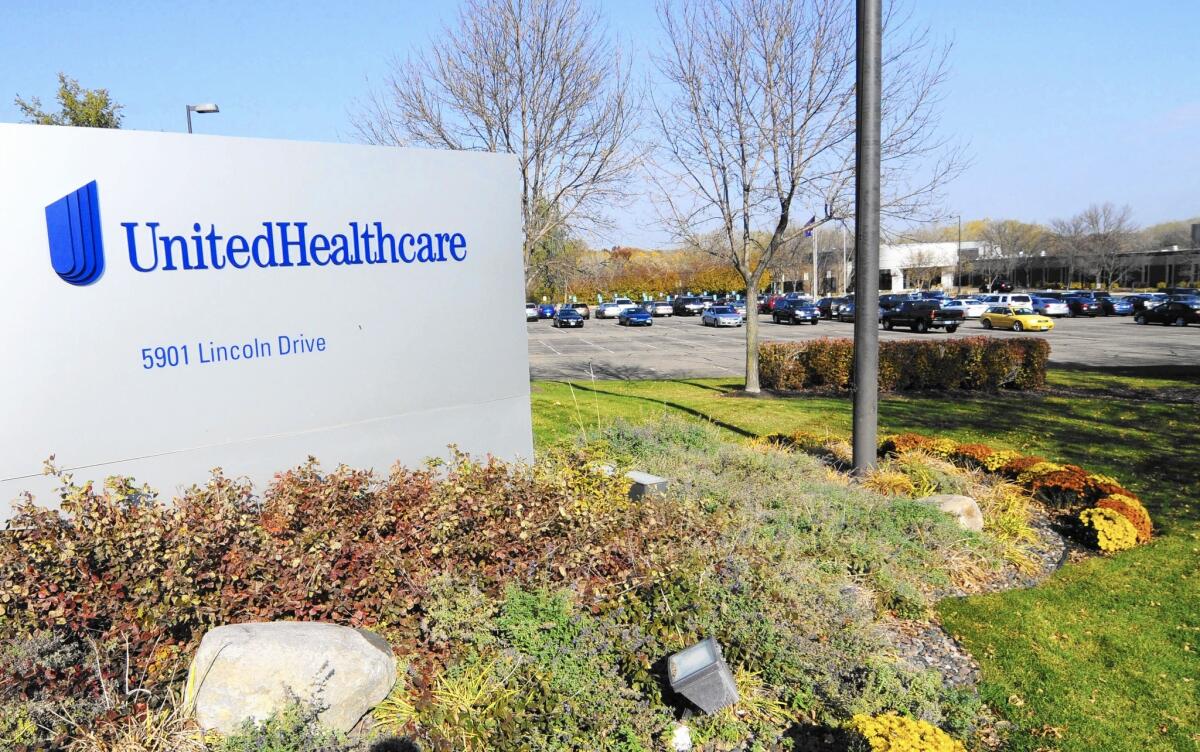Insurers UnitedHealth, Oscar are poised to join Covered California

- Share via
Two new health insurers are poised to join California’s market for Obamacare coverage — industry giant UnitedHealth and a New York start-up named Oscar.
Many consumers may welcome the new choices starting next year and the prospect that increased competition helps hold down premiums. The lack of more health plans to choose from has been a sore point for some Covered California customers during the rollout of the Affordable Care Act.
But the state’s decision to consider adding UnitedHealth Group Inc., the nation’s largest health insurer, but limit it to a handful of smaller markets in more rural areas has drawn fire.
Covered California is expected to announce 2016 rates and coverage options Monday in Sacramento. Officials declined to discuss the results of their insurance company negotiations before then.
California’s rate increases are a closely watched yardstick for how President Obama’s signature health law is performing nationwide. This year, the average increase was a relatively modest 4.2%.
Next year, premiums for the most popular Silver plans are projected to rise 5.8%, on average, in eight exchange markets outside California, according to Avalere Health, a Washington consulting firm.
But double-digit rate hikes are likely to hit some of the 1.4 million Californians enrolled, depending on their health insurer and where they live.
In all, 44% of exchange policyholders already find it difficult to pay their monthly premiums, a recent survey shows.
“What people care most about is price,” said Anthony Wright, executive director of Health Access, a consumer advocacy group. “We’ll see if Covered California was able to use its bargaining power to good effect.”
California’s insurance commissioner and some consumer groups have already chided the state exchange for a lack of competition because the state’s four largest insurers control 94% of the market.
With that in mind, Covered California is expected to add UnitedHealth and upstart Oscar Insurance Corp. in select markets.
Neither company responded to requests for comment.
In January, the exchange rejected UnitedHealth’s request to sell statewide and instead limited the company to several smaller markets.
Covered California imposed that restriction because UnitedHealth left the state’s individual market at the end of 2013 and spurned the launch of the exchange.
Peter Lee, executive director of Covered California, has said established insurers shouldn’t be free to come in as a late arrival and undercut rivals who stepped up at the start to sign up Californians under the health law.
In a filing to state regulators, UnitedHealth said it intends to offer individual policies on the exchange in five of the state’s 19 rating regions.
Those areas are predominantly rural counties in Northern California, but they also include Santa Barbara, Ventura and San Luis Obispo counties.
In four of those five regions, Anthem Inc. and Blue Shield of California combined account for 92% or more of the market.
Jamie Court, president of Consumer Watchdog in Santa Monica, said the exchange should welcome more companies across the board.
It’s wrong, he said, for Covered California to deny choices to consumers and shield its biggest players, Anthem Blue Cross and Blue Shield of California, from increased competition.
“It’s really outrageous Covered California would limit competition for the Blues,” he said. “This is really a cartel and the exchange is giving United the bread crumbs. Most states would be begging health insurers to come in.”
In contrast, Wright of Health Access said he supports Covered California’s decision to limit UnitedHealth’s return initially to underserved markets.
“It’s good to give those areas some relief,” he said. “Adding UnitedHealth to the L.A. market, which already has a bunch of plans, doesn’t add a lot of value.”
Oscar, a relative unknown in the state, is expected to join a more crowded field of competitors in Southern California.
The small insurer has told regulators it wants to sell individual policies in Orange County and part of Los Angeles County.
Oscar prides itself on customer service with a high-tech touch. That might strike a chord with some consumers frustrated with the maddening bureaucracy of many big-name insurers.
The start-up is valued at roughly $1.5 billion and backed by several high-profile venture capitalists such as Silicon Valley billionaire Peter Thiel. The company is named for a great-grandfather of one of the founders.
Oscar has enrolled more than 40,000 Obamacare customers in New York and New Jersey, the two states where it sells now. California is part of the company’s aggressive expansion plan.
To win over customers and grab attention, Oscar offers a service that allows customers to talk with physicians over the phone for free any time. It also gives members a free fitness tracker and the opportunity to earn cash rewards for reaching a certain number of steps daily.
Both UnitedHealth and Oscar have told regulators they intend to sell similar coverage outside the exchange. UnitedHealth will be offering policies statewide outside Covered California.
The big difference for consumers is that Obamacare premium subsidies are available only inside the state marketplace.
People can qualify for subsidies if they make less than four times the federal poverty level, which is about $47,000 annually for a single adult and $97,000 for a family of four.
Twitter: @chadterhune
More to Read
Inside the business of entertainment
The Wide Shot brings you news, analysis and insights on everything from streaming wars to production — and what it all means for the future.
You may occasionally receive promotional content from the Los Angeles Times.











